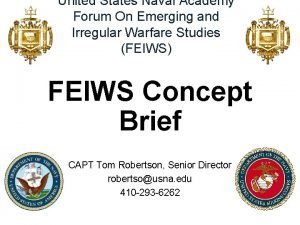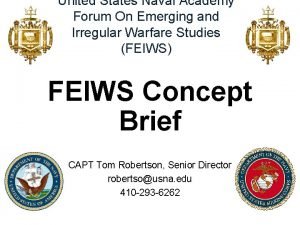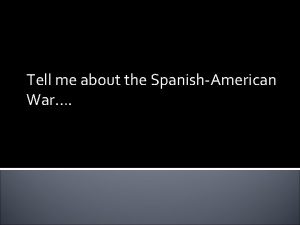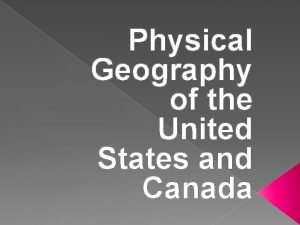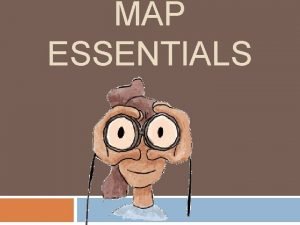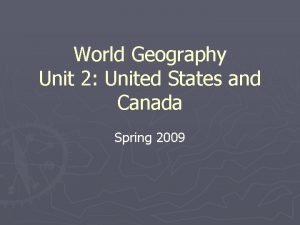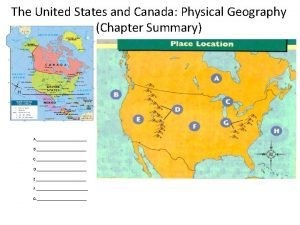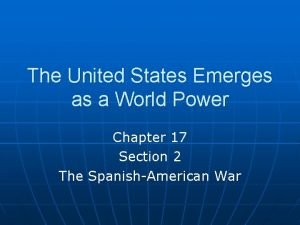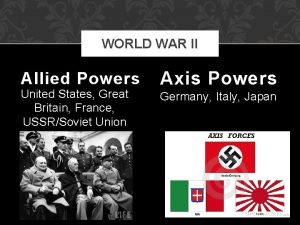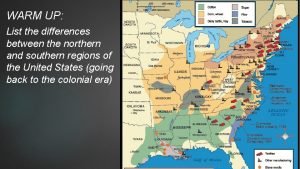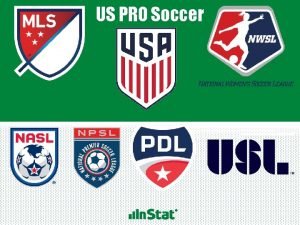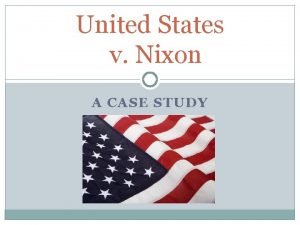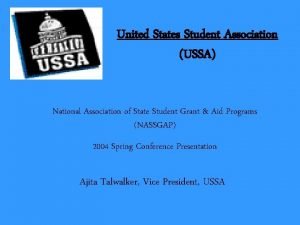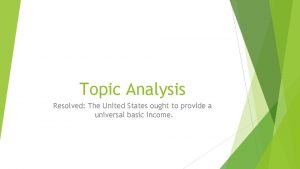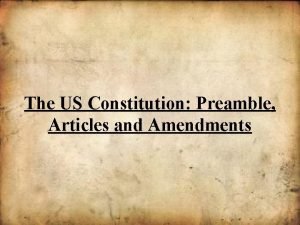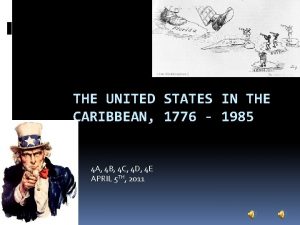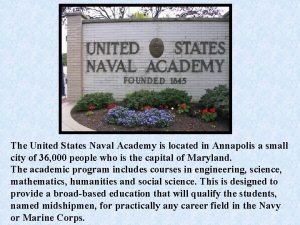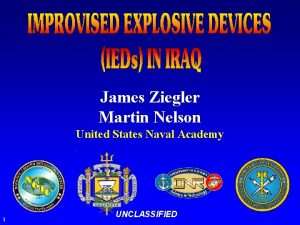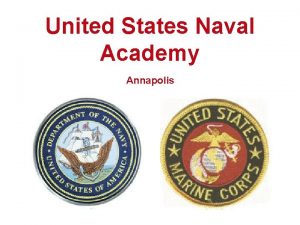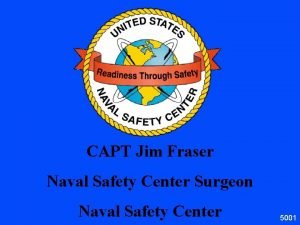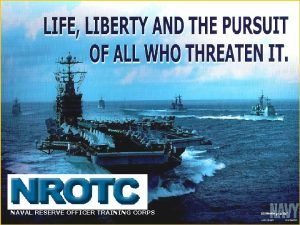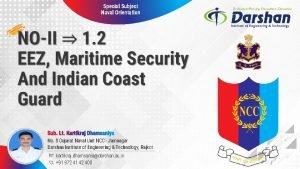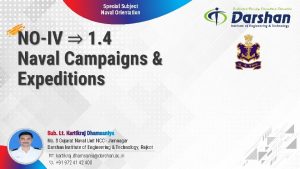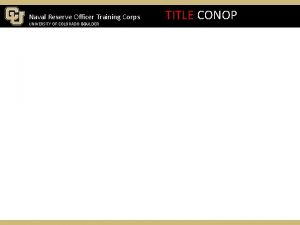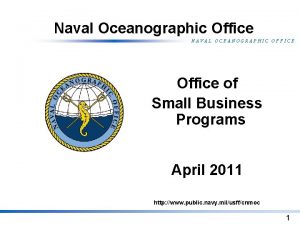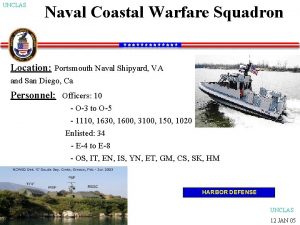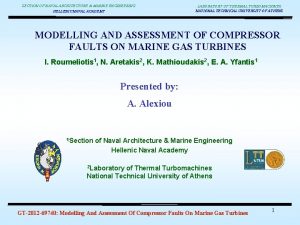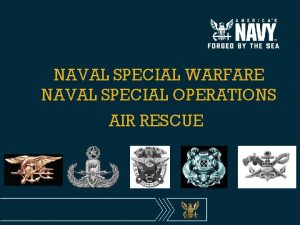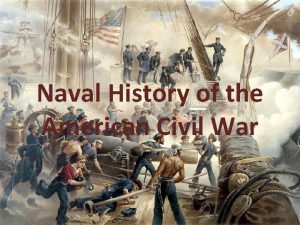United States Naval Academy Forum On Emerging and


















- Slides: 18

United States Naval Academy Forum On Emerging and Irregular Warfare Studies (FEIWS) FEIWS Concept Brief CAPT Tom Robertson, Senior Director robertso@usna. edu 410 -293 -6262

Introductions • CAPT Tom Robertson, USN – Director • LTC Jon Klug, USA - Director • LT J. T. Kadz, USN - Deputy Director • FEIWS (pronounced “Fuse”)

Emerging Security Challenges TERRORISM IRREGULAR TRADITIONAL HYBRID WARS DISRUPTIVE

Questions for Midshipmen • What factors drive changes in our human world? • What most determines who wins wars? • Are you doing your best to understand these factors and prepare yourself to lead in our changed and changing world? “Every day you spend here at USNA, you are building your foundation for understanding and for leadership. ”

USNA CHARTER: Non-Technical (Group 3) Courses • Teach midshipmen how to think critically “How do I solve a complex problem when there is no checklist or easy answers? ” • Historical depth, language skills, regional expertise and cultural knowledge (LREC)

FEIWS Charter • To increase understanding and facilitate discussions of emerging and irregular warfare. • Focus on culturally, technologically and historically informed discussions of contemporary military operations and tactics. • Link theory/ doctrine with practice and to leverage academic scholarship to help understand real-world military operations.

FEIWS Approach • Faculty (military and civilian) collaboration to share papers, conference presentations, recent cultural or combat experience and research projects (USNA and international). • Coursework development • USNA Yard-wide presentations by group members or outside speakers to faculty, staff and midshipmen followed by small-group discussion or classroom visits.

FEIWS Concept • Collaboration • Coursework development U. S. SOCOM IAPP and other outside partners FEIWS Faculty and Midshipmen Collaboration Combat Experience/ Cultural Experience • Outside speaker collaboration through military and OGA connections (i. e. Special Operations Command Interagency Partnership Program)

Progress at USNA: Emerging Warfare/ Irregular Warfare (Some examples) HH 367 A Mercenaries, Empire & War: History of India Pakistan & Afghanistan HH 367 B History and Culture of Iran HH 367 C War, Conflict, and Insurgency in Africa The U. S. in Africa since 1700 HH 367 D HH 367 E HH 372 Modern Pakistan, Militant Islam and America The Golden Age of Piracy HH 377 A HH 377 B HH 377 E Religion and Violence History of Technology History of America’s War on Drugs HH 385 The U. S. Marine Corps HH 386 A HH 386 B History of Modern Counterinsurgency The American Way of War HH 386 C The History of Airpower HH 377 A History of Technology and Cyberwarfare Chinese Art of War HH 462 B HH 485 A NE 203 NP 430 Disruptive Technology and Education Ethics and Moral Reasoning for the Naval Leader The Ethics of Irregular Warfare

FEIWS Center of Excellence (Proposed) • Counter Terror (CT) – Reference CTC, U. S. Military Academy, West Point • Counter Proliferation (CP) – On-going collaboration with USSOCOM IAPP and OGAs in support of Special Operations Support Teams’ (SOST) and other’s request for connection to academia • Counter Threat Finance (CTF) – On-going collaboration with DHS ICE and ASD SO/LIC

Nine FEIWS-affiliated military faculty members have been deployed from USNA as advisors in embedded training teams or to senior operational staffs in Afghanistan and Iraq. History Department • CAPT Hagerott: Strategic Initiatives Group, NTM-A, 2009 -2010 • CAPT Felker: Command Historian, NTM-A, 2010 -2011 • CAPT Robertson: Embedded Afghan Advisor, NMAA, NTM-A, 2010 Augment Pilot, CJTF 82 Afghanistan, 2008 Augment Pilot, MAG-16 REIN Iraq, 2006 • Lt. Col Berry, USMC: MEU Det OIC, AV-8 B, 2012 Embedded Advisor, NMAA, NTM-A, 2010 • Lt. Col Aaron O’Connell, USMCR, Gen. Petreaus Staff, ISAF-A, 2010 -2011 • LTC Klug, USA: Strategic Planner/ GSG-5 Advisor, IJC, 2012 -2013 Deputy SIG, NTM-A, 2009 -2010 Company Commander/ Regimental Planner, 3 ACR, 2003 Political Science Department • Lt Fletcher: Embedded Advisor, NMAA, NTM-A, 2010 Math Department • LT Heineike: Embedded Advisor, NMAA, NTM-A, 2010 Chemistry Department • LT Bodemer: Embedded Advisor, NMAA, NTM-A, 2010

Internship Opportunities • FEIWS has negotiated for internship opportunities in which midshipmen spend summer training blocks at: ‾ U. S. Army War College Peacekeeping and Stability Operations Institute (USAWC PKSOI) ‾ Johns-Hopkins Applied Physics Lab National Security Analysis Department (JHU/APL) ‾ Marine Corps University

Findings • USNA FEIWS is currently an ad hoc and unfunded group. Possible partners, synergies (international collaboration) or funding sources: stand-alone USNA Warfare Center of Excellence and/or connection with Cyber Center. • Relationships within the IW community are essential to improving our groups, staffing the war effort and also in disseminating lessons learned. • Potential exists to create a single point of contact “reachback” pool of expertise for use by combatant commanders connecting the warfighter to U. S. military and other government agency capabilities.

Questions? robertso@usna. edu

Background slides

USNA Strengths in this Area • High level of midshipman interest- “How can I get involved …? ” • Early foundation for future thought and development (Mids not yet “indoctrinated”) • USNA grads become small unit leaders soon after graduation “where the rubber meets the road” • Military instructors experience: active involvement -recently returned from Iraq, Afghanistan and Horn of Africa, etc. • Interdisciplinary cooperation

USNA Challenges in this Area • Core course syllabi not specifically designed to target Irregular and Emerging Warfare • Targeted courses available to only a small percentage of the student population • Current progress is largely based on military instructor initiative – if the instructor transfers, the course often dies • Lack of coordination with post-graduate and other institutions (need networking/ relationships to help build the right foundation)

Example Course - HH 386 A The History of Modern Counterinsurgency • Block 1 – The Principles and Nature of Irregular Warfare • Block 2 – Counterinsurgency case studies: British Afghanistan and Malaya, French Indochina and Algeria, Soviet Afghanistan among others • Block 3 – Irregular Warfare and COIN Theory • Block 4 – The U. S. Experience with Irregular Warfare (1776 to Present) • Block 5 – Non-state entities and emerging warfare
 Coast guard academy forum
Coast guard academy forum Naval academy forum
Naval academy forum Royal norwegian naval academy
Royal norwegian naval academy Awake united states date and author
Awake united states date and author United states and canada physical map
United states and canada physical map Map of the world with longitude and latitude lines
Map of the world with longitude and latitude lines Mediterranean climate in us
Mediterranean climate in us Does canada have mountains
Does canada have mountains Us history regents essay
Us history regents essay Unit 2 the united states and canada worksheet answers
Unit 2 the united states and canada worksheet answers United states acquisitions and annexations 1857-1904
United states acquisitions and annexations 1857-1904 Was the united states on the axis powers or allied powers?
Was the united states on the axis powers or allied powers? 36 30 line
36 30 line National premier soccer league
National premier soccer league United states v. nixon significance
United states v. nixon significance United states student association
United states student association The united states ought to provide a universal basic income
The united states ought to provide a universal basic income Constitution preamble
Constitution preamble The united states in the caribbean 1776 to 1985
The united states in the caribbean 1776 to 1985
